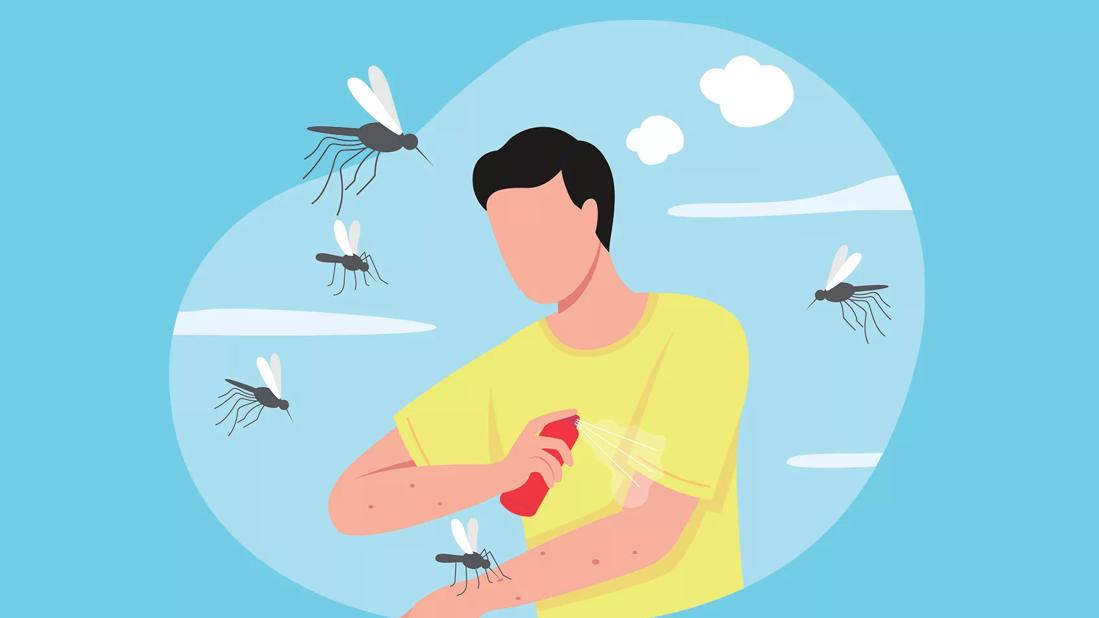Keep ‘mozzies’ at bay by avoiding scented body products, beer and certain colored clothes

Image content: This image is available to view online.
View image online (https://assets.clevelandclinic.org/transform/bbc27fd1-15a7-4349-a2c7-f27669d71e92/Attracting-Mosquitos-1321090336-770x533-1_jpg)
Person applying insect repellent spray, with mosquitoes all around
It’s not all in your head: You actually could be more attractive to mosquitoes than other people.
Advertisement
Cleveland Clinic is a non-profit academic medical center. Advertising on our site helps support our mission. We do not endorse non-Cleveland Clinic products or services. Policy
Emergency medicine specialist Christopher Bazzoli, MD, discusses why these blood-sucking beasts target some of us over others, and how you can avoid being bitten.
Did you know that female mosquitoes are the ones who bite humans? They need our blood to develop fertile eggs. Here’s what appeals to them.
Mosquitoes’ sense of smell tells them when a human target is within striking distance. And scented body products — especially those with strong floral scents — attract the blood-sucking bugs.
“Mosquitoes are attracted to our body odor, but they’re also attracted to the things we use to mask it, such as perfumes or deodorants,” says Dr. Bazzoli.
If you really want the mosquitoes to mind their own business, avoid using a moisturizing lotion before going outside. Many of these products contain lactic acid, which can attract them.
“Some of the products we use for rejuvenating purposes have alpha-hydroxy acids in them, which is an attractant to mosquitoes,” explains Dr. Bazzoli.
Research shows that mosquitoes are drawn to certain colors like red, orange, black and cyan (a blue-green color). Any clothing you wear that sports these colors can attract mosquitoes.
“This may explain why mosquitoes are attracted to human skin, as many people have complexions that feature a red or pink undertone,” notes Dr. Bazzoli.
Advertisement
But the news isn’t all bad: The study also shows that wearing clothing with green, purple, blue and white could have a deterrent effect.
Could your milkshake be bringing all the mosquitoes to the yard? If it’s a banana milkshake, it’s possible!
Some people believe that the following attract mosquitoes:
There hasn’t been any research to support those claims. But studies do show that beer and bananas can increase the chances of mozzies seeking you out.
Mosquitoes can pick up on your body’s thermal sensory information.
They prefer warm environments. So, if you’re feeling sweaty or overheated — or you just tend to run hot — your skin may be prime mosquito real estate.
A study observed that mosquitoes in a certain area seemed to prefer people with one specific blood type over others. But did they actually have a preference? And if they did, why? And do all mosquitos have those same preferences?
Scientists don’t know. One theory is that our genes affect both our blood type and other elements of our biology that attract mosquitoes. But according to Dr. Bazzoli, the jury’s still out.
High concentrations of any of the following on your skin’s surface could trigger a mosquito’s sense of smell:
Few things switch up your body chemistry as much as pregnancy. And a 2000 study of malaria-carrying mosquitoes found they’re twice as likely to be attracted to pregnant women compared to women who aren’t pregnant.
Mosquitoes can smell carbon dioxide, which you produce every time you exhale. Cardiovascular exercise makes you huff and puff, upping the carbon dioxide levels around you even more.
You’ll get a similar effect if you’re taking rapid, shallow breaths (tachypnea) for another reason, like asthma or an infection.
While you may be attractive to mosquitoes for reasons beyond your control, you can reduce your risk of being bitten by using repellants, wearing loose-fitting clothing and staying indoors at dawn and dusk.
“While mosquitoes are best known for the pesky itching bites they leave behind, they can also carry diseases,” clarifies Dr. Bazzoli. “Therefore, it’s important to protect yourself.” He suggests doing the following to prevent mosquito bites:
Advertisement

Sign up for our Health Essentials emails for expert guidance on nutrition, fitness, sleep, skin care and more.
Learn more about our editorial process.
Advertisement
Vanilla extract won’t keep mosquitoes away for long, if at all — and could even attract other bugs, like wasps or flies
Alpha-gal syndrome has become more common and is a leading cause of anaphylaxis
These red, raised bites often show up in a zigzag pattern on areas of your skin that come into contact with bedding
Twice daily tick checks, the right bug sprays and long pants can help you prevent tick-borne diseases
Bug bites create tiny openings in your skin that can let in dangerous bacteria
Using insect repellent, covering up and keeping your property dry can help keep the buggers at bay
Kissing bugs are insects that can carry a dangerous parasite that causes Chagas disease
Whether you scrape or pull out the stinger, the key is to do it quickly
Although it could be used as a moisturizer, this new trend is not recommended
Communicating clear limits helps protect your time, energy and emotional well-being
High cholesterol can be genetic, but testing and treatment can lower your heart disease risk